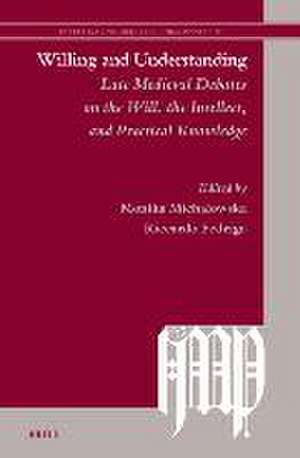Willing and Understanding: Late Medieval Debates on the Will, the Intellect, and Practical Knowledge: Investigating Medieval Philosophy, cartea 19
Monika Michałowska, Riccardo Fedrigaen Limba Engleză Hardback – 15 mar 2023
Charting a dense map of voluntarist and epistemological ideas—entrenched leitmotifs of late medieval philosophy, seminal insights sparking original trends, and ephemeral novelties—the volume is a testimony to the conceptual multidimensionality and ethical complexity of the past and present iterations of the debate on the will.
Contributors are Pascale Bermon, Magdalena Bieniak, Michael W. Dunne, Riccardo Fedriga, Giacomo Fornasieri, Tobias Hoffmann, Severin V. Kitanov, Monika Michałowska, Riccardo Saccenti, Sonja Schierbaum, Michael Szlachta, Łukasz Tomanek, and Francesco Omar Zamboni.
Din seria Investigating Medieval Philosophy
- 18%
 Preț: 794.14 lei
Preț: 794.14 lei - 18%
 Preț: 730.87 lei
Preț: 730.87 lei - 18%
 Preț: 840.91 lei
Preț: 840.91 lei - 18%
 Preț: 725.52 lei
Preț: 725.52 lei - 18%
 Preț: 762.86 lei
Preț: 762.86 lei - 18%
 Preț: 672.32 lei
Preț: 672.32 lei - 18%
 Preț: 764.02 lei
Preț: 764.02 lei - 18%
 Preț: 699.39 lei
Preț: 699.39 lei - 18%
 Preț: 625.24 lei
Preț: 625.24 lei - 18%
 Preț: 812.53 lei
Preț: 812.53 lei - 18%
 Preț: 939.67 lei
Preț: 939.67 lei - 18%
 Preț: 1037.79 lei
Preț: 1037.79 lei - 18%
 Preț: 716.04 lei
Preț: 716.04 lei - 18%
 Preț: 610.67 lei
Preț: 610.67 lei - 18%
 Preț: 780.70 lei
Preț: 780.70 lei
Preț: 966.98 lei
Preț vechi: 1255.81 lei
-23% Nou
Puncte Express: 1450
Preț estimativ în valută:
185.03€ • 190.89$ • 154.41£
185.03€ • 190.89$ • 154.41£
Carte disponibilă
Livrare economică 01-07 martie
Livrare express 19-25 februarie pentru 103.44 lei
Preluare comenzi: 021 569.72.76
Specificații
ISBN-13: 9789004540323
ISBN-10: 9004540326
Dimensiuni: 155 x 235 mm
Greutate: 0.73 kg
Editura: Brill
Colecția Brill
Seria Investigating Medieval Philosophy
ISBN-10: 9004540326
Dimensiuni: 155 x 235 mm
Greutate: 0.73 kg
Editura: Brill
Colecția Brill
Seria Investigating Medieval Philosophy
Notă biografică
Monika Michałowska, Ph.D. (2007), is Professor at the Medical University of Łódź. Her research focuses on late medieval ethics and theology. She has critically edited Richard Kilvington’s Quaestiones super libros Ethicorum and Quaestiones super libros Sententiarum (Brill, 2016, 2021, 2023).
Riccardo Fedriga is Professor of history of ideas at the University of Bologna. He has published several articles and books on philosophy of mind and action in medieval thought, including Safeguarding Free Will (Ksiegarnia Akademicka Publishing, 2022) with Monika Michałowska.
Riccardo Fedriga is Professor of history of ideas at the University of Bologna. He has published several articles and books on philosophy of mind and action in medieval thought, including Safeguarding Free Will (Ksiegarnia Akademicka Publishing, 2022) with Monika Michałowska.
Cuprins
Preface
Notes on Contributors
1 The Complexity of Late Medieval Debates on the Will
Introduction
Riccardo Fedriga and Monika Michałowska
2 Fear and Conditional Will in Stephen Langton’s Quaestiones and in the Summa Halensis
Magdalena Bieniak
3 What Tips the Scales?
Volition, Motivation, and Choice in Faḫr al-Din al-Razi
Francesco Omar Zamboni
4 How Do Intellect and Will Interact?
Thomas Aquinas, Godfrey of Fontaines, and the Determination-Exercise Distinction
Michael Szlachta
5 Understanding and Acting
Deliberation, the Practical Intellect, and Moral Science at the University of Bologna (Gentile da Cingoli, Angelo d’Arezzo, and Cambiolo da Bologna)
Riccardo Saccenti
6 John of Pouilly’s Intellectualist Reading of the March 7, 1277 Condemnation
Tobias Hoffmann
7 Cognitive Attention and Impressions
The Role of the Will in Peter Auriol’s Theory of Concept Formation
Giacomo Fornasieri
8 Dissolving the Air of Inconsistency
William Ockham on Virtuous Volitions and Cognitive Error
Sonja Schierbaum
9 Hybernicus contra Thomam
Richard FitzRalph on the Will and His Critique of Aquinas on the Primacy of the Intellect over the Will
Michael W. Dunne
10 Cracking the Code of the Will
Richard Kilvington on the Will and Logic
Monika Michałowska
11 Adam Wodeham’s Analysis and Defense of Free Will
Severin V. Kitanov
12 Gregory of Rimini and the Augustinian Theory of the Will
Examples of a Mediaeval Reading of Augustine’s De libero arbitrio
Pascale Bermon
13 Necessity, Contingency, and Free Will in John of Jandun and John Aurifaber of Halberstadt
The Transmission of Ideas from Paris to Erfurt in the 14th Century
Łukasz Tomanek
Index of Ancient, Medieval, and Renaissance Names
Index of Modern Names
Notes on Contributors
1 The Complexity of Late Medieval Debates on the Will
Introduction
Riccardo Fedriga and Monika Michałowska
2 Fear and Conditional Will in Stephen Langton’s Quaestiones and in the Summa Halensis
Magdalena Bieniak
3 What Tips the Scales?
Volition, Motivation, and Choice in Faḫr al-Din al-Razi
Francesco Omar Zamboni
4 How Do Intellect and Will Interact?
Thomas Aquinas, Godfrey of Fontaines, and the Determination-Exercise Distinction
Michael Szlachta
5 Understanding and Acting
Deliberation, the Practical Intellect, and Moral Science at the University of Bologna (Gentile da Cingoli, Angelo d’Arezzo, and Cambiolo da Bologna)
Riccardo Saccenti
6 John of Pouilly’s Intellectualist Reading of the March 7, 1277 Condemnation
Tobias Hoffmann
7 Cognitive Attention and Impressions
The Role of the Will in Peter Auriol’s Theory of Concept Formation
Giacomo Fornasieri
8 Dissolving the Air of Inconsistency
William Ockham on Virtuous Volitions and Cognitive Error
Sonja Schierbaum
9 Hybernicus contra Thomam
Richard FitzRalph on the Will and His Critique of Aquinas on the Primacy of the Intellect over the Will
Michael W. Dunne
10 Cracking the Code of the Will
Richard Kilvington on the Will and Logic
Monika Michałowska
11 Adam Wodeham’s Analysis and Defense of Free Will
Severin V. Kitanov
12 Gregory of Rimini and the Augustinian Theory of the Will
Examples of a Mediaeval Reading of Augustine’s De libero arbitrio
Pascale Bermon
13 Necessity, Contingency, and Free Will in John of Jandun and John Aurifaber of Halberstadt
The Transmission of Ideas from Paris to Erfurt in the 14th Century
Łukasz Tomanek
Index of Ancient, Medieval, and Renaissance Names
Index of Modern Names
